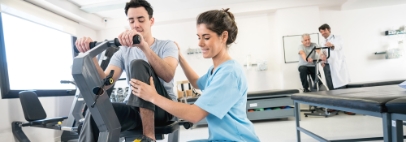Monday to Friday 8.00 am to 5.00 pm
Legs and arms are the main sources of pain
The most typical symptom of a disc hernia is the so-called sciatica pain. This often comes from the back or buttocks and extends into the legs. All pain is always triggered by the nerve that is affected by the disc hernia: most frequently it is the lowest two discs (L4/5 and L5/S1). Herniated discs are referred to as "radicular pain", which originates from the nerve root.
A herniated disc L4/5 causes pain on the front and outside of the thigh due to pressure on the L5 nerve, radiating down the front of the lower leg to the big toe.
A herniated disc L5/S1 tends to cause pain in the back of the thigh and lower leg as far as the sole of the foot and the outer edge of the foot. Pain in the lower back can be severe, especially at the beginning, but then often disappears, so that the main problem with a disc hernia is usually the leg pain and not the back pain. There is also other annoying nerve pain, which can be associated with numbness and discomfort (tingling).
In the case of a disc hernia in the cervical spine, pain radiates into the arms. In some cases, the compressed nerve also leads to more severe neurological disorders such as muscle weakness (paralysis) and, in extreme cases, loss of bladder and rectal function (urinary and faecal incontinence). The latter is known as "cauda syndrome" and is an absolute surgical emergency.


.jpg)

